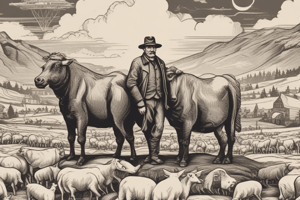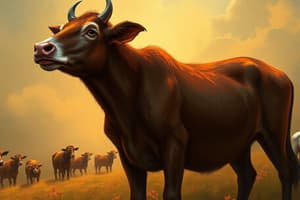Podcast
Questions and Answers
What is one of the main messages delivered by Old Major in his speech?
What is one of the main messages delivered by Old Major in his speech?
- Humans are the cause of animal suffering. (correct)
- All animals are enemies of each other.
- Animals need to compete for resources.
- Animals should learn to live without conflict.
What happens during the Battle of the Cowshed?
What happens during the Battle of the Cowshed?
- Snowball successfully leads the animals in defense. (correct)
- The pigs negotiate a peace treaty with the farmers.
- Humans and animals join forces against a common enemy.
- The animals lose control of Animal Farm.
What does the motto 'I will work harder' represent in Animal Farm?
What does the motto 'I will work harder' represent in Animal Farm?
- Boxer's unwavering dedication to the cause. (correct)
- A lack of understanding of their oppression.
- The animals' hope to defeat the humans.
- The animals' collective strength in unity.
What significant action does Napoleon take against Snowball?
What significant action does Napoleon take against Snowball?
What becomes of the windmill after it is constructed?
What becomes of the windmill after it is constructed?
What do the Seven Commandments primarily establish for the animals?
What do the Seven Commandments primarily establish for the animals?
How does Napoleon justify trading with humans?
How does Napoleon justify trading with humans?
Which animal's leadership is significantly contested by Napoleon?
Which animal's leadership is significantly contested by Napoleon?
What event leads to the animals suffering severe hardship during winter?
What event leads to the animals suffering severe hardship during winter?
Which commandment is ultimately changed to reflect the pigs' power?
Which commandment is ultimately changed to reflect the pigs' power?
What happens to Boxer after he is injured?
What happens to Boxer after he is injured?
How do the pigs justify their actions throughout the story?
How do the pigs justify their actions throughout the story?
What is the representation of the character Squealer?
What is the representation of the character Squealer?
What signifies Napoleon's growing authoritarianism?
What signifies Napoleon's growing authoritarianism?
What is revealed by the van that takes Boxer away?
What is revealed by the van that takes Boxer away?
Which character represents the working class?
Which character represents the working class?
What happens to the windmill during the Battle of the Windmill?
What happens to the windmill during the Battle of the Windmill?
How does Napoleon’s relationship with the neighboring farms change?
How does Napoleon’s relationship with the neighboring farms change?
What do the sheep represent in the story?
What do the sheep represent in the story?
What does the flag of Animal Farm symbolize?
What does the flag of Animal Farm symbolize?
How does Napoleon manipulate the food supply during the harsh winter?
How does Napoleon manipulate the food supply during the harsh winter?
What does the collapse of Boxer symbolize?
What does the collapse of Boxer symbolize?
Flashcards
Old Major's Speech
Old Major's Speech
Old Major, an elderly boar, gathers the animals to deliver a speech about overthrowing their human farmer, Mr. Jones. He calls for equality, freedom, and a better life without human oppression.
The Rebellion
The Rebellion
The animals, inspired by Old Major, rebel against their human farmer, Mr. Jones, and successfully seize control of the farm. They rename it 'Animal Farm' and establish a new society based on animal equality.
The Seven Commandments
The Seven Commandments
Seven Commandments are established to guide the new society on Animal Farm. These commandments emphasize equality and a rejection of human practices. The core principle is 'All animals are equal.'
The Pigs Assume Leadership
The Pigs Assume Leadership
Signup and view all the flashcards
Battle of the Cowshed
Battle of the Cowshed
Signup and view all the flashcards
Snowball vs. Napoleon
Snowball vs. Napoleon
Signup and view all the flashcards
Snowball's Exile
Snowball's Exile
Signup and view all the flashcards
Napoleon Deals with Humans
Napoleon Deals with Humans
Signup and view all the flashcards
Betrayal of the Commandments
Betrayal of the Commandments
Signup and view all the flashcards
Napoleon's Power Grab
Napoleon's Power Grab
Signup and view all the flashcards
Trading with Humans
Trading with Humans
Signup and view all the flashcards
Changing Commandments
Changing Commandments
Signup and view all the flashcards
Boxer's Betrayal
Boxer's Betrayal
Signup and view all the flashcards
Pigs Become Humans
Pigs Become Humans
Signup and view all the flashcards
Final Commandment
Final Commandment
Signup and view all the flashcards
Farm's State of Decline
Farm's State of Decline
Signup and view all the flashcards
Growing Inequality
Growing Inequality
Signup and view all the flashcards
Battle of the Windmill
Battle of the Windmill
Signup and view all the flashcards
Deception of the Animals
Deception of the Animals
Signup and view all the flashcards
Confessions and Purge
Confessions and Purge
Signup and view all the flashcards
Pigs' Leadership
Pigs' Leadership
Signup and view all the flashcards
Animalism Principles
Animalism Principles
Signup and view all the flashcards
Study Notes
Animal Farm Summary
-
Core Themes: Animal Farm allegorically critiques the Russian Revolution and the rise of Stalinism. It illustrates the dangers of power corrupts and the betrayal of ideals.
-
Animal Rebellion: Animals revolt against the human farmer, Mr. Jones, aiming for equality on Animal Farm.
-
Seven Commandments: Rules designed to guide animal society, emphasizing equality but later corrupted by the pigs.
-
The Pigs' Rise to Power: Pigs, initially part of the revolution, consolidate power under Napoleon's leadership, exploiting and manipulating the other animals.
-
Snowball vs. Napoleon: Conflict between Snowball (representing Trotsky) and Napoleon (representing Stalin) leads to Snowball's exile; Napoleon secures absolute control.
-
Windmill Project: A symbol of hope and progress, the windmill's construction becomes a source of hardship and further animal exploitation.
-
Boxer's Treatment: The loyal, hardworking Boxer is tragically betrayed and exploited by the pigs.
-
Manipulation and Deception: The pigs use propaganda (Squealer) to control the animals and manipulate their beliefs.
-
Loss of Ideals: The initial revolutionary ideals are corrupted over time. The Seven Commandments are progressively changed to suit the pigs' desires.
-
Pigs' Transformation: The pigs eventually adopt human behaviors, dress in clothes, and drink alcohol, mirroring the very humans they initially overthrew.
-
All Animals Are Equal (but Some Are More Equal): The ultimate slogan highlights the hypocrisy and corruption of the system.
Key Characters
- Old Major: Represents the revolutionary ideal; he inspires the rebellion.
- Napoleon: Represents Stalin; a ruthless dictator.
- Snowball: Represents Trotsky; a rival revolutionary leader.
- Boxer: Represents the hardworking working class, demonstrating unwavering loyalty but being exploited.
- Squealer: Represents Soviet propaganda; a master manipulator, concealing injustices and promoting lies.
Symbolic Representations
- Animals: Symbolic of various social groups and classes. (Boxer representing the working class)
- The Farm: Represents Russia (or the Soviet Union) and its societal problems.
- Individual animals: Pigs represent the leadership class and those who exploit ideas and plans to benefit themselves.
- Humans: Represent the establishment and the forces that exploited the revolutionary gains
Events
-
Battle of Cowshed: A demonstration of animal resistance against human attempts to regain control.
-
The Pigs' Growing Corruption: Depicts the corrupting influence of power and deviation from revolutionary ideals.
-
The Final Change to the Commandment: The ultimate betrayal of the initial vision and ideals.
Studying That Suits You
Use AI to generate personalized quizzes and flashcards to suit your learning preferences.




